The Elon Musk owned micro-blogging site Twitter has dug out a huge scandal involving suppression of a truth that was crucial politically at the nick of time. The accused in this social media trial is the site’s former employee and legal head Vijaya Gadde. As announced earlier by Musk, he got an associate to do the story in the form of a thread, a series of tweets, titled “The Twitter Files”.
In the story, which author Matt Taibbi starts with a proper introduction — never mind he cannot go beyond 280 characters per tweet — he says how wonderful the medium used to be at its inception. He goes on to reveal the next stage where tools were developed for legitimate censorship, for example of child pornography. The third stage was what muzzled free speech and those tools went into the hands of governments and political parties — of the US in particular. While both Republicans and Democrats approached Twitter to ask it to pull down content that did not suit them, given that the employee democraphic under Jack Dorsey was skewed in favour of the left, it proved godsend for the Joe Biden campaign.
Taibbi writes regularly via Substack, an American online platform that provides publishing, payment, analytics, and design infrastructure to support subscription newsletters, for Twitter, sending digital newsletters directly to subscribers.
“Both parties had access to these tools. For instance, in 2020, requests from both the Trump White House and the Biden campaign were received and honored. However, this system wasn’t balanced. It was based on contacts. Because Twitter was and is overwhelmingly staffed by people of one political orientation, there were more channels, more ways to complain, open to the left (well, Democrats) than the right,” Taibbi explained with the following screenshot:
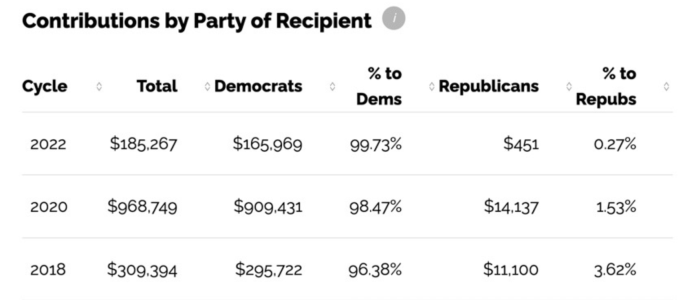
Further down in the thread, Taibbi revealed that on 14 October 2020, “the New York Post published BIDEN SECRET EMAILS, an expose based on the contents of Hunter Biden’s abandoned laptop.
“Twitter took extraordinary steps to suppress the story, removing links and posting warnings that it may be ‘unsafe’. They even blocked its transmission via direct message, a tool hitherto reserved for extreme cases, e.g. child pornography,” Taibbi tweeted.
In case you missed it then: “Hunter Biden asked brother’s widow to get HIV-tested in 2018“
“White House spokeswoman Kaleigh McEnany was locked out of her account for tweeting about the story, prompting a furious letter from Trump campaign staffer Mike Hahn, who seethed: ‘At least pretend to care for the next 20 days’,” wrote Taibbi.
“This led public policy executive Caroline Strom to send out a polite WTF query. Several employees noted that there was tension between the comms/policy teams, who had little/less control over moderation, and the safety/trust teams,” Taibbi wrote with the following screenshot:

“Strom’s note returned the answer that the laptop story had been removed for violation of the company’s “hacked materials” policy,” the author said, sharing a link and a screenshot.
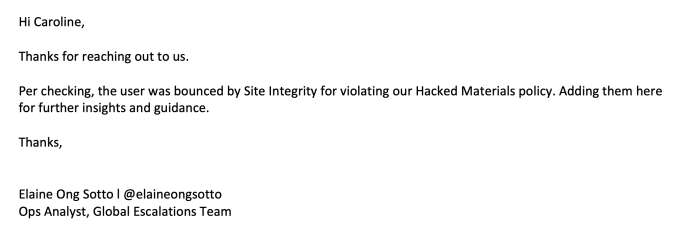
“Although several sources recalled hearing about a ‘general’ warning from federal law enforcement that summer about possible foreign hacks, there’s no evidence — that I’ve seen — of any government involvement in the laptop story. In fact, that might have been the problem.
Recall: Hunter, the controversial son of Joe Biden
“The decision was made at the highest levels of the company, but without the knowledge of CEO Jack Dorsey, with former head of legal, policy and trust Vijaya Gadde playing a key role,” Taibbi informed the Twitter readership.
He wrote further: “‘They just freelanced it,’ is how one former employee characterized the decision. ‘Hacking was the excuse, but within a few hours, pretty much everyone realized that wasn’t going to hold. But no one had the guts to reverse it.'”
“You can see the confusion in the following lengthy exchange, which ends up including Gadde and former Trust and safety chief Yoel Roth. Comms official Trenton Kennedy writes, ‘I’m struggling to understand the policy basis for marking this as unsafe’,” Taibbi wrote with this screenshot:
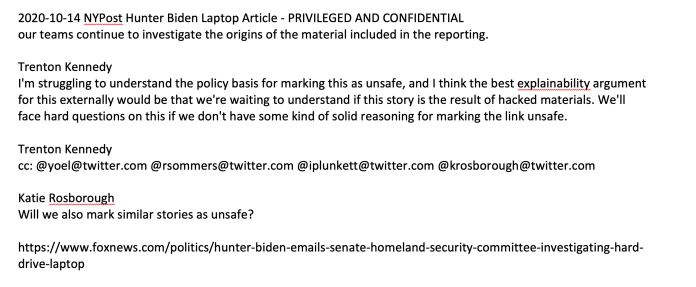
“By this point ‘everyone knew this was fu*ked,’ said one former employee, but the response was essentially to err on the side of… continuing to err.
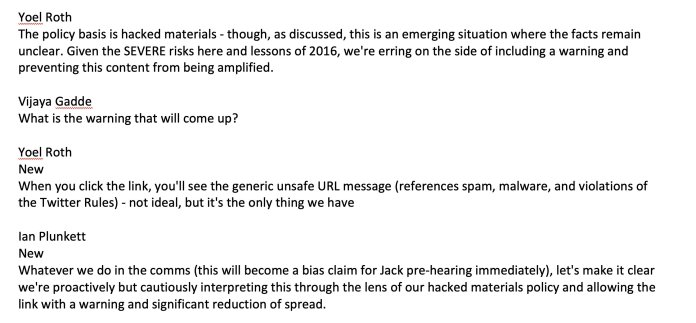
“Former VP of Global Comms Brandon Borrman asks, ‘Can we truthfully claim that this is part of the policy?’ … To which former Deputy General Counsel Jim Baker again seems to advise staying the non-course, because ‘caution is warranted’,” Taibbi revealed using the following screenshot:

Further down, the author wrote, “In one humorous exchange on day 1, Democratic congressman Ro Khanna reaches out to Gadde to gently suggest she hop on the phone to talk about the ‘backlash re speech’. Khanna was the only Democratic official I could find in the files who expressed concern.”

“Gadde replies quickly, immediately diving into the weeds of Twitter policy, unaware Khanna is more worried about the Bill of Rights:
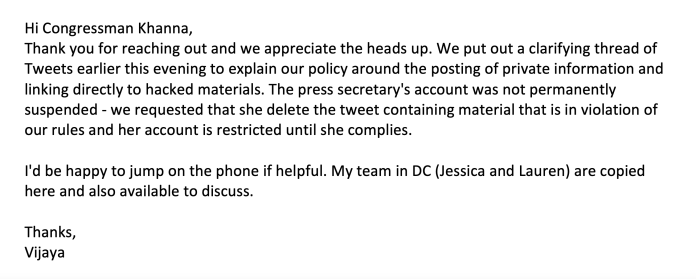
“Khanna tries to reroute the conversation to the First Amendment, mention of which is generally hard to find in the files:
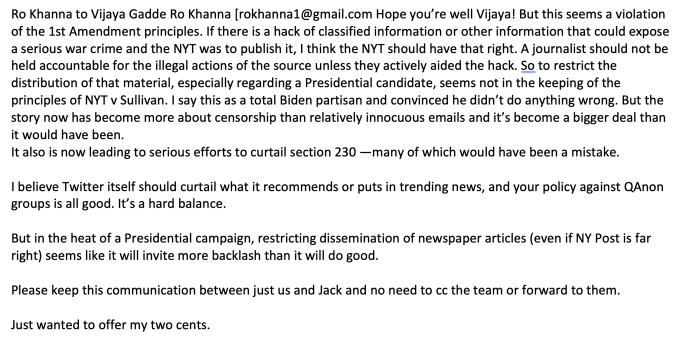
“Within a day, head of Public Policy Lauren Culbertson receives a ghastly letter/report from Carl Szabo of the research firm NetChoice, which had already polled 12 members of congress — 9 Rs (Republicans) and 3 Democrats, from ‘the House Judiciary Committee to Rep. Judy Chu’s office.’
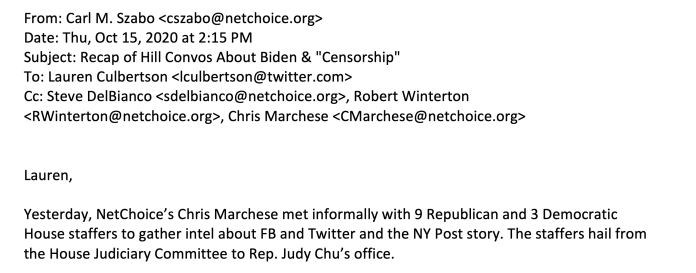
“NetChoice lets Twitter know a ‘blood bath’ awaits in upcoming Hill hearings, with members saying it’s a ‘tipping point’, complaining tech has ‘grown so big that they can’t even regulate themselves, so government may need to intervene.’
“Szabo reports to Twitter that some Hill figures are characterizing the laptop story as ‘tech’s Access Hollywood moment’. Szabo’s letter contains chilling passages relaying Democratic lawmakers’ attitudes. They want ‘more’ moderation, and as for the Bill of Rights, it’s ‘not absolute’.
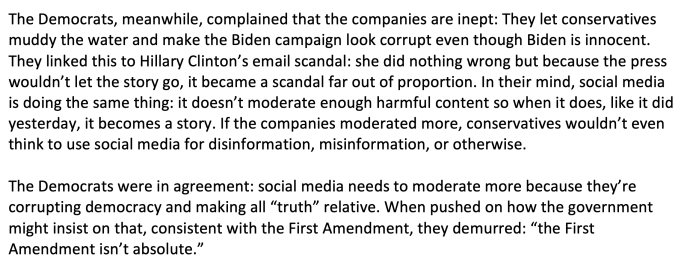
“An amazing subplot of the Twitter/Hunter Biden laptop affair was how much was done without the knowledge of CEO Jack Dorsey, and how long it took for the situation to get ‘unfu*ked’ (as one ex-employee put it) even after Dorsey jumped in,” Taibbi disclosed, elaborating, “There are multiple instances in the files of Dorsey intervening to question suspensions and other moderation actions, for accounts across the political spectrum.”
“The problem with the ‘hacked materials’ ruling, several sources said, was that this normally required an official/law enforcement finding of a hack. But such a finding never appears throughout what one executive describes as a ‘whirlwind’ 24-hour, company-wide mess,” Taibbi concluded before bidding goodbye to his readers.
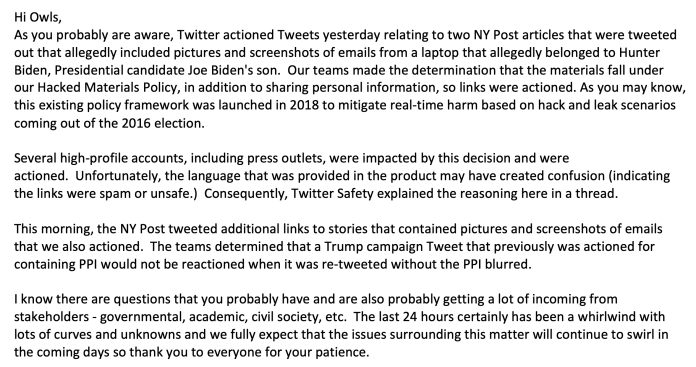


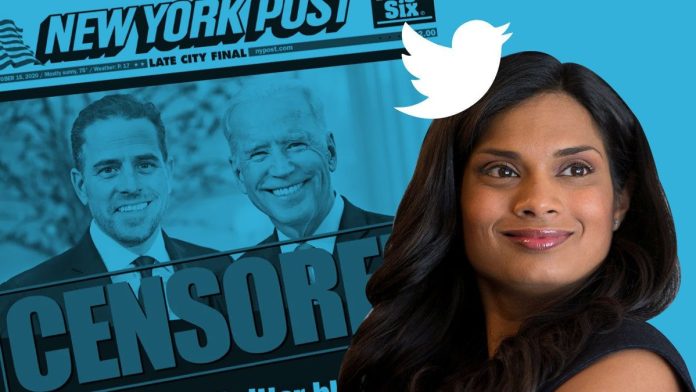
You must log in to post a comment.